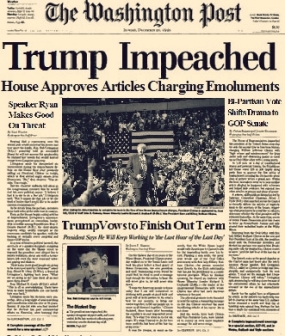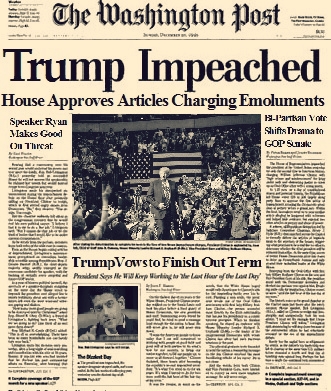Every now and then, contrary to the 140-character Zeitgeist, I like to go into the weeds. So, let’s start with the headline itself:
Reince Priebus: Donald Trump Won’t ‘Meddle’ With Social Security And Medicare
The story, written by Daniel Marans, began this way:
Incoming White House Chief of Staff Reince Priebus appeared to confirm that President-elect Donald Trump would stand by his campaign promise not to cut Social Security and Medicare.
Notice that word “appeared.” It wasn’t in the headline, which clearly claimed that Priebus said Trump “won’t” meddle with Social Security and Medicare. But Priebus didn’t say that, as the lead clarifies. Also notice that word “confirm” in the lead. Priebus “appeared to confirm“ Trump’s campaign “promise.” Think about that one. We are asked to believe that Priebus, one of Trump’s many obfuscators, not only “appeared to confirm” Trump’s promise, but that Priebus actually possesses the ability to confirm it. We know, though, that no one, including Priebus, actually can confirm anything Trump has said or will say. We know that because Trump is both a pathological liar and a pathological denier, and the  word “promise” has no real applicability to him. Trump can’t even confirm something he himself said. What he promised yesterday, what he promises today, Trump can, and will, deny tomorrow. And his surrogates will follow suit.
word “promise” has no real applicability to him. Trump can’t even confirm something he himself said. What he promised yesterday, what he promises today, Trump can, and will, deny tomorrow. And his surrogates will follow suit.
That’s why journalists and headline writers have to be careful. They have to stop playing by the old journalistic rules, which no longer apply. Social media-obsessed people, as we all know, skim headlines as a shortcut to understanding what’s going on in the news. And that HuffPo headline—an outlet that ought to know better—is particularly harmful to the public’s understanding of what is going on, or, more to the point, what might happen in the months to come, in terms of Social Security and Medicare and, before it’s over, Medicaid.
Let’s look at the transcript of what Priebus said on CBS’s Face the Nation:
JOHN DICKERSON: Quick question on replace. Donald Trump has campaigned on the idea of not touching Medicare. That’ll be his position still?
REINCE PRIEBUS: Yeah. I mean, I don’t think President-elect Trump wants to meddle with Medicare or Social Security. He made a promise in the campaign that that was something that he didn’t want to do. But what he wants to do is grow the economy, help shore up Medicare and Social Security for future generations. And if we can get three to five, 6% growth, we’ll do that. And we’ll explode the economy, and bring jobs back, and make trade more fair across the world, lower rates for everyone, and I think hopefully get businesses going again so people can put more money in their pocket.
Notice a couple of things. First, why is John Dickerson only asking a “quick question” about “touching Medicare”? Doesn’t the possibility of Trump joining Paul Ryan and the reactionaries in his party, in their effort to destroy Medicare as we know it, deserve more than a quick question? Of course it does. But apparently TV journalism has its priorities, and understanding whether Trump intends on preserving Social Security and Medicare doesn’t happen to be one of them. So, because Dickerson did not follow up on Priebus’ assertions, we will at least examine his words ourselves:
1. Note that Dickerson did not specifically ask Priebus about Social Security (even though he should have). Priebus brought up Social Security on his own. Why? We can guess it’s because Priebus knows “entitlement reform” is a big deal to Paul Ryan and his Houseful of reactionaries, and that Ryan’s so-called reform includes mucking with Social Security in ways that will screw needy beneficiaries, many of whom voted for Trump. Thus, the “Old-Age, Survivors, and Disability Insurance” program—which is what we rubes know as Social Security— was on his mind.
2. Priebus said “I don’t think” Trump “wants to meddle with Medicare and Social Security.” He didn’t say “I am certain.” He didn’t say “I am absolutely confident.” He merely said he didn’t think Trump would renege. He was speculating not asserting. He was, purposely, leaving room for future betrayal. Because, as noted, no one can confidently assert anything regarding any statement Trump has made—or will make.
3. Priebus’ weak speculation that Trump won’t bother Social Security and Medicare is based on certain assumptions, like Trump bringing us explosive economic growth, bringing back manufacturing jobs, negotiating and renegotiating trade deals, and lowering tax rates, which “hopefully get businesses going again so people can put more money in their pocket.” The problem is that businesses are already going again, people have more money in their pockets, and there aren’t many economists this side of Sean Hannity who believe in all that standard Reagan-era voodoo magic. Thus, the premise for suggesting that Trump will not mess with entitlements is based on art-of-the-deal and supply-side fantasies.
4. Now look at these two sentences: “He made a promise in the campaign that that was something that he didn’t want to do. But what he wants to do is grow the economy, help shore up Medicare and Social Security for future generations.” Priebus said that Trump’s messing with the two big entitlement programs “was something that he didn’t want to do,” like having to spank an unruly child. The way that sentence is constructed leaves a lot of room for meddling, especially when coupled with the second sentence. One can imagine a future appearance on Face the Nation in which Priebus will say Trump didn’t want to sign Social Security and Medicare “reform” bills, but it was necessary to “shore up” the programs because economic growth lagged behind projections due to Democratic Party interference. “Things were much worse than he imagined during the campaign, and Democrats have conspired to make them worse in order to hurt Trump,” this future Priebus can say about Trump’s broken promise. Or Priebus—feel free to substitute your surrogate of choice—can point to something Trump said to the AARP:
If we are able to sustain growth rates in GDP that we had as a result of the Kennedy and Reagan tax reforms, we will be able to secure Social Security for the future. As our demography changes, a prudent administration would begin to examine what changes might be necessary for future generations. Our goal is to keep the promises made to Americans through our Social Security program.”
There is a giant “if” in that statement: “If we are able to sustain growth rates in GDP that we had as a result of the Kennedy and Reagan tax reform.” I hate to till over-farmed ground, but people need to be reminded of the facts. First, Kennedy did reduce the top marginal tax rate from 91% to 70%. But today’s highest rate is just less than 40%. Any effect of lowering taxes for people in the highest bracket today will not have much, if any, salutary economic effect. Second, Kennedy targeted earners who would spend their tax breaks and thus stimulate the economy. There isn’t a GOP plan out there today anything like that. Most of the proposed tax cuts would go to top-bracket people who will simply bank the money, not go out and buy a new Chevy Cruze made—by union workers—in Lordstown, Ohio.
As for Reagan, the myth lives on. The truth is that although he reduced marginal income tax rates, he raised other taxes and closed large loopholes. The net effect wasn’t significant, except in terms of normalizing large budget deficits because of his increase in military spending (which deficits, weirdly, have been blamed on Democrats ever since). Thus, Trump’s “if” statement—which I am sure is the product of some nutty supply-side economist and not his own creation—will not bear the burden of protecting Social Security, or Medicare, or any entitlement, in the future.
Then there is, “As our demography changes, a prudent administration would begin to examine what changes might be necessary for future generations.” The political ambiguity in that phrase, again the product of someone other than Trump—who wouldn’t know anything about “demography” unless it was a dues-paying member of Mar-a-Lago—is wide enough to drive an Ayn Rand tractor-trailer through. A Ryan-friendly Trump, if it came to it, could easily cite demographic changes that his “prudent administration” could use to make “necessary” reforms, all in the name of “future generations.” That’s right out of the Paul Ryan-Pete Peterson playbook.
In any case, there is one thing we know with absolute certainty: Paul Ryan, the Speaker of the House, is determined to implement his once-in-a-lifetime, one-party-rule offense according to his ideological playbook. He is hellbent on privatizing Medicare and reducing Social Security benefits. If you don’t believe me, try Forbes or, uh, Forbes. And there are only two things, right now, that stand between Ryan and his goal. One is the Senate Democratic Caucus, which features several wobbly-kneed Democrats from red states—and keep in mind that Senate Democrats only have power if the filibuster remains, not exactly a certainty in these strange times. The other obstacle for Ryan is Trump. And Ryan will soon have some important leverage over the Orange Grifter: the threat of impeachment.
 Ryan’s dream of destroying—or failing that, weakening—New Deal ideology can obviously only come to pass if Trump signs onto the effort and openly defends it. Ryan dare not advance his Randian agenda without the backing of Trumpers, who have proven they will follow Trump no matter what he does. And it is my rather wild theory that Ryan may use the threat of impeachment—which has to originate in the House—to get Trump to sign on and defend his assent. This impeachment threat would not, at first, be advanced openly. As time passes, it would be—if it hasn’t been already—quietly passed on to Trump associates, like Reince Priebus, who will inform Trump that insurance against impeachment will come at the price of “meddling” with entitlements (something that Priebus, as a political and personal friend of Ryan, is inclined to do anyway). Such a quiet threat could have its intended effect without an open display of hostility toward Trump on the part of House Republicans.
Ryan’s dream of destroying—or failing that, weakening—New Deal ideology can obviously only come to pass if Trump signs onto the effort and openly defends it. Ryan dare not advance his Randian agenda without the backing of Trumpers, who have proven they will follow Trump no matter what he does. And it is my rather wild theory that Ryan may use the threat of impeachment—which has to originate in the House—to get Trump to sign on and defend his assent. This impeachment threat would not, at first, be advanced openly. As time passes, it would be—if it hasn’t been already—quietly passed on to Trump associates, like Reince Priebus, who will inform Trump that insurance against impeachment will come at the price of “meddling” with entitlements (something that Priebus, as a political and personal friend of Ryan, is inclined to do anyway). Such a quiet threat could have its intended effect without an open display of hostility toward Trump on the part of House Republicans.
I won’t pretend this is a likely scenario. The ultimate manifestation of the developing dynamics of the next administration’s relationship with a Republican Congress is anyone’s guess. But since impeachment will be part of the general conversation the minute Trump takes office (see: Emoluments Clause, for instance), and will continue to dog him throughout his presidency, it is not entirely nuts to think something like my scenario could happen. With Trump, just the hint that he could go down in history as an impeached president may itself be enough to find enough room in his AARP statement, “As our demography changes, a prudent administration would begin to examine what changes might be necessary for future generations,” to accommodate substantial changes in entitlement programs.
After all, Trump has never given a damn about working-class people except as a means to his narcissistic ends, and why should he stick his presidential neck out for them, especially when he has a legion of spinners who can sell his treachery to his followers?
All this is just something to keep in mind, as we slowly descend into the abyss of the Trump presidency. Stay tuned.







